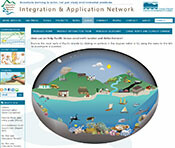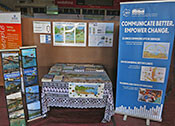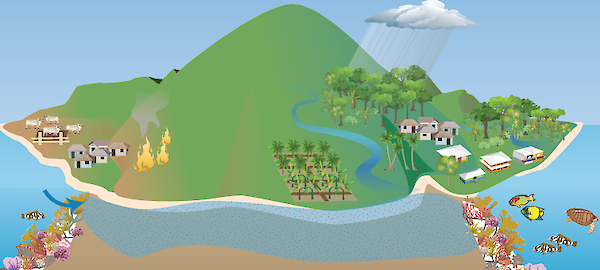Coral reefs and climate change education module
 The Integration and Application Network and the National Park Service Pacific Island Network Inventory and Monitoring Program are pleased to announce the release of the Coral Reefs and Climate Change module. Interactive elements allow students to explore the biodiversity of coral reefs, collect data about coral cover with the same methods used by scientists, see into the future as unchecked carbon emissions increase ocean acidification and erode corals, and imagine how their daily lives would be different without coral reefs. Specifically designed to allow students to choose their experience and observe the topics that are most interesting to them, this web module uses games, videos, and animations to help students observe corals and inspire them to develop their own questions. In addition, teachers can access lessons and activities associated with the module content. Teachers can download state and national teaching standards, learning objectives, materials lists, and worksheets that will allow them to use the module in their classroom.
The Integration and Application Network and the National Park Service Pacific Island Network Inventory and Monitoring Program are pleased to announce the release of the Coral Reefs and Climate Change module. Interactive elements allow students to explore the biodiversity of coral reefs, collect data about coral cover with the same methods used by scientists, see into the future as unchecked carbon emissions increase ocean acidification and erode corals, and imagine how their daily lives would be different without coral reefs. Specifically designed to allow students to choose their experience and observe the topics that are most interesting to them, this web module uses games, videos, and animations to help students observe corals and inspire them to develop their own questions. In addition, teachers can access lessons and activities associated with the module content. Teachers can download state and national teaching standards, learning objectives, materials lists, and worksheets that will allow them to use the module in their classroom.
9th Pacific Islands Conference on Nature Conservation and Protected Areas
 IAN staff attended the 9th Pacific Islands Conference on Nature Conservation and Protected Areas in Fiji in early December, setting up our first IAN conference booth. Our booth proved extremely popular, with almost all of our materials ravaged by the end of the first day! The conference itself was a fantastic opportunity to meet Pacific-based colleagues that we've worked with virtually, and to catch up with others. IAN diagrams and reports were featured in several keynote presentations and workshops throughout the conference, and we've started lining up potential new collaborations for the next few years. The word is getting out!
IAN staff attended the 9th Pacific Islands Conference on Nature Conservation and Protected Areas in Fiji in early December, setting up our first IAN conference booth. Our booth proved extremely popular, with almost all of our materials ravaged by the end of the first day! The conference itself was a fantastic opportunity to meet Pacific-based colleagues that we've worked with virtually, and to catch up with others. IAN diagrams and reports were featured in several keynote presentations and workshops throughout the conference, and we've started lining up potential new collaborations for the next few years. The word is getting out!
New release: Drought in the U.S.- Affiliated Pacific Islands

US Affiliated Pacific Islands. In 2015, IAN began a national-scale effort with the USGS National Climate Adaptation Science Center (NCASC) to synthesize the impacts of ecological drought across the country. Workshops were held at each of the nation’s eight regional Climate Adaptation Science Centers covering the following regions: Alaska, Pacific Islands, Northwest, Southwest, North Central, South Central, Northeast, and Southeast. During the Pacific Islands workshop in March 2017 in Honolulu, Hawaii, it became clear that the high islands of the Hawaiian archipelago were not representative of the diverse U.S.-Affiliated Pacific islands (USAPI), and so a ninth workshop was planned to capture aspects of drought in the islands. This newsletter highlights the outcomes of a two-day workshop held in Honolulu, focusing on past, current, and future impacts of drought throughout the USAPI.